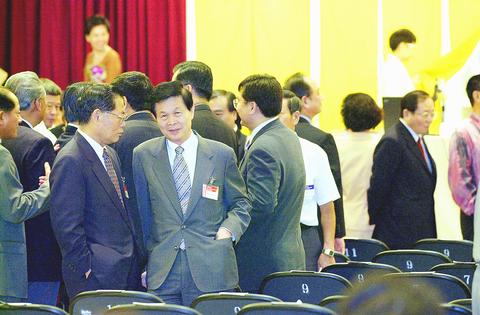The KMT's 210-seat Central Committee yesterday approved the party's slate of nominees for legislator-at-large amid complaints from committee members about their being treated as a "rubber stamp."
Each of the 41 recommended nominees passed ballots by Central Committee members without any surprising twists.
Topping the list of nominees are Legislative Yuan vice speaker Yao Eng-chi (

PHOTO: GEORGE TSORNG, TAIPEI TIMES
A recommended nominee can only be screened out if over half of the Central Committee members vote against him. The order of the nominees will not be rearranged according to the number of approval votes they obtain.
This is the first time the KMT has let the Central Committee vote to decide the legislator-at-large nominees, which is part of the party's plan for internal democratic reform.
However, many outspoken lawmakers in attendance at the Central Committee meeting expressed strong opposition to the ballot rules which they say are undemocratic and give them little room to make changes to the list.
"We Central Committee members are here to serve simply as a rubber stamp," said legislator Chen Ching-pao (陳清寶).
Legislator Apollo Chen (
"Most people on the list are strangers to us, though none of them are our enemies. We don't know how are we going to exercise our right of veto," Chen said.
The 41 nominees were selected by the KMT's nomination review panels from a total of 130 contestants vying for the party's nomination. Only those who rank within the top 16 to 19 are considered likely to win seats, based on a forecast of the KMT's showing in the year-end legislative elections.
A total of 41 legislator-at-large seats are available, and they will be allocated to political parties according to their share of the vote in the constituency-based elections.
In addition to criticism of the ballot rules, reformists within the KMT expressed their disappointment that the party's nominees for legislator-at-large seats weren't innovative enough to renew its image.
"For the KMT, reform has yet to succeed," said Chen Feng-hsing (陳鳳馨), a Central Committee member and former KMT spokeswoman.
Chen said the party should have nominated more high-profile candidates to fill the legislator-at-large seats and win popular support for the KMT's legislative campaign.
Also, as Taiwan is facing its worst recession in decades, the KMT should have nominated as many economic professionals as possible, Chen said.
In response to these doubts, KMT Chairman Lien Chan (
"Today's event marks a very important milestone in the KMT's democratic development. In this process, we will learn how to make democratization more progressive," Lien said.

Intelligence agents have recorded 510,000 instances of “controversial information” being spread online by the Chinese Communist Party (CCP) so far this year, the National Security Bureau (NSB) said in a report yesterday, as it warned of artificial intelligence (AI) being employed to generate destabilizing misinformation. The bureau submitted a written report to the Legislative Yuan in preparation for National Security Bureau Director-General Tsai Ming-yen’s (蔡明彥) appearance before the Foreign Affairs and National Defense Committee today. The CCP has been using cognitive warfare to divide Taiwanese society by commenting on controversial issues such as Taiwan Semiconductor Manufacturing Co’s (TSMC, 台積電) investments in the

INVESTIGATION: The case is the latest instance of a DPP figure being implicated in an espionage network accused of allegedly leaking information to Chinese intelligence Democratic Progressive Party (DPP) member Ho Jen-chieh (何仁傑) was detained and held incommunicado yesterday on suspicion of spying for China during his tenure as assistant to then-minister of foreign affairs Joseph Wu (吳釗燮). The Taipei District Prosecutors’ Office said Ho was implicated during its investigation into alleged spying activities by former Presidential Office consultant Wu Shang-yu (吳尚雨). Prosecutors said there is reason to believe Ho breached the National Security Act (國家安全法) by leaking classified Ministry of Foreign Affairs information to Chinese intelligence. Following interrogation, prosecutors petitioned the Taipei District Court to detain Ho, citing concerns over potential collusion or tampering of evidence. The

‘COMPREHENSIVE PLAN’: Lin Chia-lung said that the government was ready to talk about a variety of issues, including investment in and purchases from the US The National Stabilization Fund (NSF) yesterday announced that it would step in to staunch stock market losses for the ninth time in the nation’s history. An NSF board meeting, originally scheduled for Monday next week, was moved to yesterday after stocks plummeted in the wake of US President Donald Trump’s announcement of 32 percent tariffs on Taiwan on Wednesday last week. Board members voted to support the stock market with the NT$500 billion (US$15.15 billion) fund, with injections of funds to begin as soon as today. The NSF in 2000 injected NT$120 billion to stabilize stocks, the most ever. The lowest amount it

NEGOTIATIONS: Taiwan has good relations with Washington and the outlook for the negotiations looks promising, Minister of Economic Affairs J.W. Kuo said Taiwan’s GDP growth this year is expected to decrease by 0.43 to 1.61 percentage points due to the effects of US tariffs, National Development Council (NDC) Minister Paul Liu (劉鏡清) said at a meeting of the legislature’s Economics Committee in Taipei yesterday, citing a preliminary estimate by a private research institution. Taiwan’s economy would be significantly affected by the 32 percent “reciprocal” tariffs slapped by the US, which took effect yesterday, Liu said, adding that GDP growth could fall below 3 percent and potentially even dip below 2 percent to 1.53 percent this year. The council has commissioned another institution